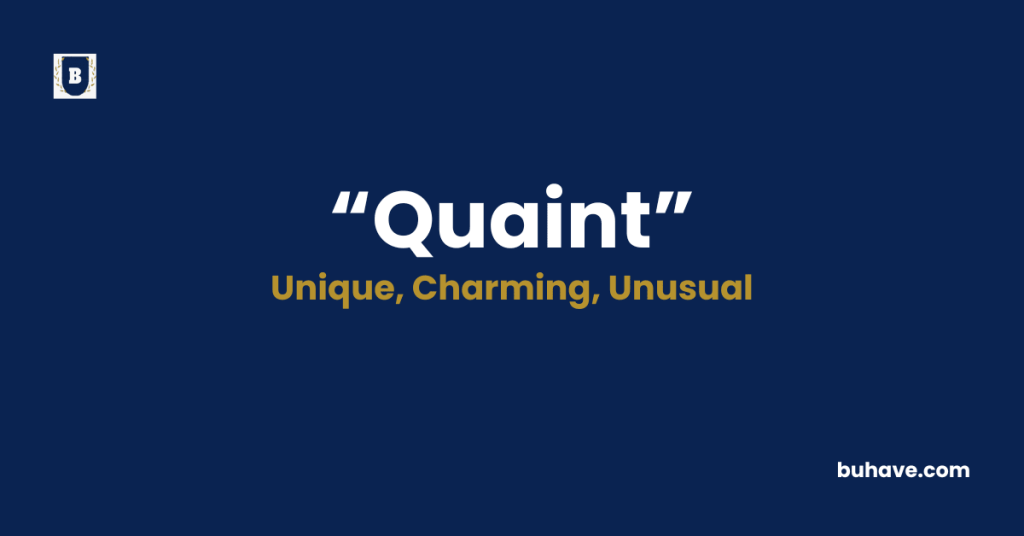The word ‘Quaint’ (Adjective) refers to something charmingly old-fashioned, unusual, or attractively curious. In this guide, you’ll learn the full definition, synonyms, antonyms, etymology, and real-life examples of how to use ‘Quaint’ correctly in sentences.
Quaint Explained in Depth
A complete and detailed guide to the words Quaint including meaning, definition, examples, etymology, synonyms, and antonyms.
Meanings of Quaint
The word “quaint” is typically used to describe things that are attractively unusual or old-fashioned. It’s often associated with charm, nostalgia, and a sense of gentle curiosity. For instance, a small village with cobblestone streets and centuries-old cottages may be called quaint because of its peaceful atmosphere and preserved, traditional character. Similarly, a hand-written letter or an antique typewriter might be described as quaint due to their rarity and the nostalgic feelings they evoke.
Unlike more modern, sleek, or high-tech descriptions, “quaint” carries a connotation of being deliberately or naturally different from the norm—especially in a pleasant and endearing way. People use this term when they want to highlight the delightful contrast between the old and the new. However, it can sometimes have a slight undertone of being outdated or impractical, depending on the context. Still, more often than not, it suggests warmth, simplicity, and a refreshing escape from the fast pace of contemporary life.
Definition
Quaint refers to something that is unusual or different in a pleasing, old-fashioned, or whimsical way. It often describes appearances, manners, or settings that evoke a sense of historic charm or gentle eccentricity.
This adjective can also apply to traditions, behavior, or speech that reflect earlier times. Someone might refer to a custom as quaint if it seems peculiar but delightful in its persistence. It’s important to note that while “quaint” celebrates uniqueness, it does so with affection and warmth, often implying that the subject has remained unspoiled by time. Thus, calling something “quaint” is a compliment rooted in admiration for its preservation of character and tradition.
Etymology
The word “quaint” has a fascinating etymological journey that dates back to the 13th century. It originates from the Old French word “cointe,” which meant “clever,” “elegant,” or “expert.” This, in turn, comes from the Latin word “cognitus,” the past participle of “cognoscere,” meaning “to know” or “to recognize.” Early uses of “quaint” in English reflected ideas of intelligence, skill, or sophistication.
As the English language evolved, the meaning of “quaint” shifted from “clever” or “skilled” to more visual and aesthetic associations. Eventually, its meaning expanded further to embrace the notions of charm and old-fashioned appeal. Today, “quaint” mostly evokes feelings of nostalgia and affection for things that are a little out of step with modernity but are nonetheless beautiful or meaningful because of that very quality.
Example Sentences
- The quaint little bakery on the corner serves the best homemade pies in town.
- She decorated her home with quaint antiques from her grandmother’s era.
- We stayed in a quaint cottage by the sea during our vacation.
- His quaint way of speaking reminded me of classic literature characters.
- The town square was filled with quaint shops and cozy cafes.
Quaint Synonyms
- Charming
- Picturesque
- Old-fashioned
- Whimsical
- Curious
- Antique
- Rustic
- Historic
- Delightful
- Nostalgic
Quaint Antonyms
- Modern
- Contemporary
- Stylish
- Up-to-date
- Trendy
- Current
- High-tech
- New
- Fashionable
- Popular
FAQs about Quaint
Here are some frequently asked questions (FAQs) about the word “Quaint”
1. What does “quaint” mean in simple terms?
It means charmingly old-fashioned or attractively unusual in a way that feels nostalgic or endearing.
2. Is “quaint” a compliment?
Yes, in most contexts it is a positive word that expresses admiration for something traditional, unique, or charming.
3. Is “quaint” the same as “old-fashioned”?
Not exactly. “Old-fashioned” can be neutral or even negative, while “quaint” usually implies charm and appeal.
4. What tone does “quaint” usually convey?
It conveys warmth, admiration, and gentle appreciation for things that are attractively different from the norm.

















